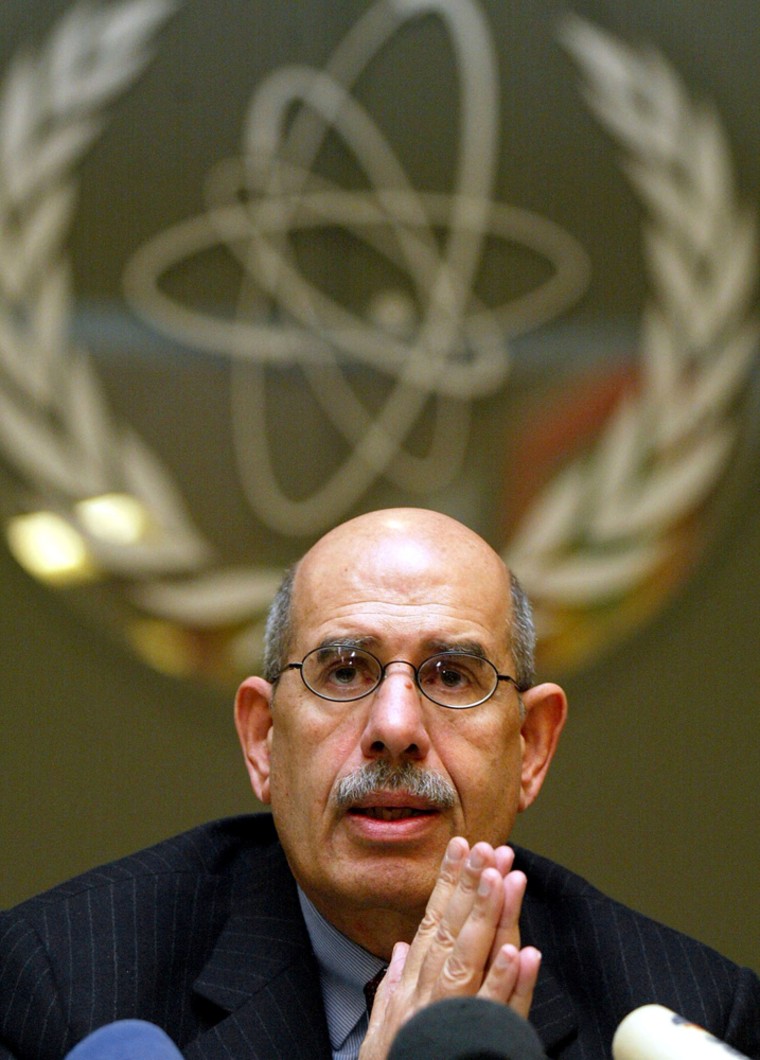Mohamed ElBaradei and the International Atomic Energy Agency won the 2005 Nobel Peace Prize on Friday for their drive to curb the spread of atomic weapons by using diplomacy to resolve standoffs with Iran and North Korea over their nuclear programs.
The Nobel Committee’s decision lent support to negotiations and inspections, not military action, as the best way to handle volatile nations. It also was seen as a message to the Bush administration, which invaded Iraq after claiming U.N. efforts to eradicate Saddam Hussein’s nuclear ambitions had failed and which opposed ElBaradei’s appointment to another term.
The Nobel committee said ElBaradei and the IAEA should be recognized for addressing one of the greatest dangers facing the world.
“At a time when the threat of nuclear arms is again increasing, the Norwegian Nobel Committee wishes to underline that this threat must be met through the broadest possible international cooperation. This principle finds its clearest expression today in the work of the IAEA and its director general,” the committee said.
‘Strong message’
ElBaradei said in Vienna, Austria, that the prize “sends a strong message” about the agency’s disarmament efforts and will strengthen his resolve to prevent the spread of nuclear weapons.
“The award basically sends a very strong message, which is: Keep doing what you are doing,” ElBaradei said. “It’s a responsibility but it’s also a shot in the arm. They want to give the agency and me a shot in the arm to move forward.”
U.N. Secretary-General Kofi Annan said in Switzerland he hoped “this award wakes us all up.”
“They need our support and I hope the leaders of the world will pay attention,” he said.
ElBaradei, who was reappointed last month to a third term, has contended with U.S. opposition to his tenure, much of it stemming from Washington’s perception he was too soft on Iran for not declaring it in violation of the Nuclear Nonproliferation Treaty.
That stance blocked a U.S. bid to haul Tehran before the U.N. Security Council, where it could face possible sanctions, for more than two years. The IAEA passed a resolution last month warning Tehran of such referral unless it allayed fears about its nuclear program.
Unfazed by U.S. opposition
ElBaradei also refused to endorse Washington’s contention that Iran was working to make nuclear weapons and disputed U.S. assertions that Saddam Hussein’s regime in Iraq had an active atomic weapons program — both claims that remain unproven, despite growing suspicions about Tehran’s nuclear agenda.
He later told the British Broadcasting Corp. he was unfazed by the U.S. opposition.
“You cannot satisfy everybody,” he said. “It’s a thankless job. You will not be able to get everybody to applaud.”
ElBaradei and the agency had been among the names mentioned as speculation mounted in recent days the Nobel committee would seek to honor the victims of nuclear weapons and those who try to contain their use.
Anti-nuclear campaigners awarded
The committee has repeatedly awarded its prize to anti-nuclear weapons campaigners on the major anniversaries of the 1945 atomic bombings of Hiroshima and Nagasaki, Japan.
“This is a message to all the people of the world: Do what you can to get rid of nuclear weapons,” Nobel committee chairman Ole Danbolt Mjoes said. “The people’s power is formidable.”
On the 50th anniversary, in 1995, the prize went to anti-nuclear campaigner Joseph Rotblat and his Pugwash group. In 1985, it went to International Physicians for the Prevention of Nuclear War and in 1975 to Soviet nuclear scientist-turned-anti-nuclear campaigner Andrei Sakharov.
“We will never give up and we must never give in,” Mjoes said.
A record 199 nominations were received for the prize, which includes $1.3 million, a gold medal and a diploma. ElBaradei and the IAEA will share the award when they receive it Dec. 10 in the Norwegian capital.
The Nobel committee called ElBaradei “an unafraid advocate” of new measures to stem the proliferation of nuclear weapons.
“At a time when disarmament efforts appear deadlocked, when there is a danger that nuclear arms will spread both to states and to terrorist groups, and when nuclear power again appears to be playing an increasingly significant role, IAEA’s work is of incalculable importance,” the committee said.
Blix offers praise
Former chief U.N. weapons inspector Hans Blix, a friend and colleague of ElBaradei, told The Associated Press the award was “very encouraging and fortunate.”
“I see it as an endorsement of the professional and independent role of the IAEA and of international verification in the field of nuclear power and nonproliferation,” Blix said.
Under ElBaradei, the IAEA has risen from a nondescript bureaucracy monitoring nuclear sites worldwide to a pivotal institution at the vortex of efforts to disarm Iran and North Korea.
Austere and methodical, ElBaradei took a strident line as he guided the agency through the most serious troubles it faced since the end of the Cold War.
He accused North Korea, for example, of “nuclear brinkmanship” in December 2002 after it expelled two inspectors monitoring a mothballed nuclear complex. Pyongyang said the plant needed to go back on line because of an electricity shortage.
